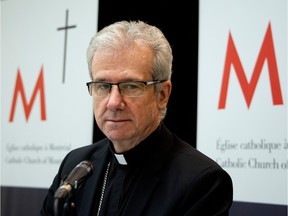Institutions like Maison St-Raphaël may feel pressured to shut their doors rather than provide a procedure they object to.

Article content
The Archbishop of Montreal has filed a legal challenge against Quebec’s end-of-life legislation, which forces palliative care homes to offer medical assistance in dying (MAID). Christian Lépine argues the law violates the religious freedom of Maison St-Raphaël, a Catholic-supported palliative care home in Montreal.
This month, the Quebec Superior Court denied St-Raphaël’s request for an exemption from the law while the litigation is underway. The court found that “the public interest” in ensuring access to MAID “is fundamental.” Why? Because the court equates MAID to ordinary medical care. But is it?
Advertisement 2
Article content
Article content
Dr. Michel Bureau, the head of Quebec’s commission on end of life care, worries that MAID is no longer seen as a last resort within that province, stating: “We’re now no longer dealing with an exceptional treatment, but a treatment that is very frequent.” Since that time, Health Canada has released its fourth annual report on MAID, revealing that MAID deaths in 2022 accounted for 6.6 per cent of total deaths in Quebec, compared to 4.7 per cent the previous year. In 2022, the Canadian average was 4.1 per cent.
In some ways, the National Assembly has done well to limit MAID expansion in Quebec. For example, Bill 11, passed in 2023, clarifies that a mental disorder other than a neurocognitive disorder cannot make a person eligible for MAID. Quebec’s end-of-life care law provides other safeguards too.
But in other ways, the government promotes MAID. Prior to Bill 11, the law permitted palliative care hospices to determine which end-of-life care options they provided in their facilities. This meant religious facilities could exclude MAID from a list of end-of-life care options. Bill 11, however, mandated that “no palliative care hospice may exclude medical aid in dying from the care it offers.”
Advertisement 3
Article content
Understandably, institutions like Maison St-Raphaël object to the change. The home seeks to help alleviate pain and enhance quality of life as people approach their natural death. The home provides an additional 12 palliative care beds and a day centre to the health care system.
The government is concerned that patients will be unable to access MAID if and when they desire it. But the solution is not to force homes to provide MAID, thereby losing their religious support. Although the government has not indicated what the penalty would be for failure to comply, an institution may feel pressured to close its doors rather than provide a procedure they object to.
One home closing its doors means fewer palliative care beds and less care overall. In a short-staffed health care system, communities need more palliative care support, not less.
Canadian media have shared many stories in recent years about patients who could not access adequate care and were offered MAID contrary to their wishes. In a context where MAID is no longer seen as a last resort, some patients want to receive care in a place they know they will never be offered MAID. The government of Quebec prefers to make such institutions obsolete.
Advertisement 4
Article content
Beyond that, health care should not be about forcing individuals or institutions to participate in a controversial procedure, one about which the Supreme Court of Canada stated in 2015: “nothing in the declaration of invalidity (of criminal prohibitions on assisted death) which we propose to issue would compel physicians to provide assistance in dying.” Instead, physicians and health care institutions must be permitted to act in line with their moral and religious beliefs.
If the Quebec government believes people need more access to MAID, the onus should fall on the government rather than on health care facilities seeking to provide quality palliative care. Rather than pushing religious institutions out of providing health care, governments should give them the freedom to continue helping the sick and dying in their communities — without offering to kill them.
Daniel Zekveld is a policy analyst with the Association for Reformed Political Action (ARPA) Canada, a grassroots Christian political advocacy organization.
Recommended from Editorial
Advertisement 5
Article content
Article content






